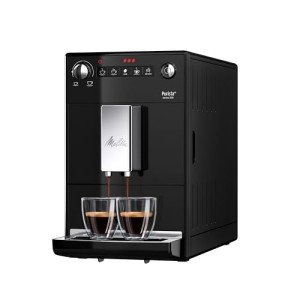Home Use Espresso Machines: A Comprehensive Guide
Espresso machines have actually ended up being a staple in numerous homes as coffee lovers look for to duplicate café-quality brews in the convenience of their kitchen areas. The increase in popularity has actually led to a diverse market filled with numerous designs, features, and prices. This short article intends to provide an informative overview of home use espresso machines, assisting readers navigate their alternatives successfully.
Comprehending Espresso Machines
Espresso machines work by forcing hot water through finely-ground coffee under high pressure, leading to a concentrated coffee beverage understood as espresso. There are a number of kinds of espresso machines classified based on their brewing methods and level of automation. The most common types consist of:
- Manual Espresso Machines: These require the user to manage the pressure and water circulation, enabling a more hands-on coffee-making experience.
- Semi-Automatic Espresso Machines: These use automatic control over water pressure, while the user by hand grinds and tamps the coffee.
- Automatic Espresso Machines: With the push of a button, these machines automatically manage the flow of water, making it easier to brew espresso with constant outcomes.
- Super-Automatic Espresso Machines: These all-in-one machines deal with grinding, tampering, brewing, and even milk frothing, making them ideal for users searching for benefit.
- Pill or Pod Machines: These use pre-packaged coffee pods to create espresso with very little effort, however they restrict option in brewing methods and flavors.
Table: Comparison of Espresso Machine Types
| Type | Control Level | Reduce of Use | Cleaning up Level | Suitable For |
|---|---|---|---|---|
| Manual | User-controlled | Moderate | High | Coffee perfectionists |
| Semi-Automatic | Partial automation | Moderate | Moderate | Home baristas |
| Automatic | Totally automated | Easy | Low | Hectic people |
| Super-Automatic | Totally automated | Very simple | Very low | Convenience seekers |
| Capsule/Pod | Completely automated | Very simple | Extremely low | Casual drinkers |
Key Features to Consider
When selecting a home use espresso machine, it's important to consider different features that can substantially impact the quality of espresso and user experience.
- Pressure: Look for machines that offer a minimum of 9 bars of pressure, as this is considered ideal for brewing espresso.
- Boiler Systems: Single vs. dual boiler systems determine temperature stability and the capability to brew espresso and steam milk at the same time.
- Grinder: Integrated grinders permit newly ground coffee, which improves taste. Consider Espresso Machines Under £200 with adjustable grind settings.
- Milk Frother: For those who take pleasure in cappuccinos and lattes, a built-in steam wand or automatic frother is important.
- Size and Design: Consider your kitchen area and visual preferences. Machines are available in numerous sizes, from compact to large setups.
- Price: Home espresso machines can vary from a few hundred to numerous thousand dollars, so it's essential to develop a budget before exploring alternatives.
Pros and Cons of Home Use Espresso Machines
| Pros | Cons |
|---|---|
| Benefit of developing coffee at home | Initial investment can be high |
| Quality of espresso is frequently remarkable | Needs some skill, especially with manual machines |
| Ability to try out tastes | Upkeep and cleansing can be labor-intensive |
| Can conserve cash in the long run | Not all machines will fit every coffee choice |
Upkeep and Cleaning Tips
Keeping an espresso machine is crucial for extending its life and making sure constant brew quality. Here are some beneficial tips:
- Regular Descaling: Minerals from water can develop in the machine. Descale every 1-3 months, depending upon water firmness.
- Daily Cleaning: Rinse portafilters, baskets, and steam wands after each use to avoid coffee oils from building residue.
- Use Filtered Water: This can help in reducing mineral buildup and enhance the taste of coffee.
- Change Gaskets and Seals: These components might use out over time and needs to be changed to maintain pressure and efficiency.
- Read the Manual: Each machine has specific care instructions; following these will make sure durability.
FAQs About Home Use Espresso Machines
Q1: What is the best budget espresso machine?The best budget espresso machine frequently depends upon private needs, but models like the DeLonghi EC155 or the Breville Bambino are popular amongst users for providing terrific worth. Q2: How long do home espresso machines typically last?With correct upkeep, home espresso machines can last anywhere from 5 to 15 years, depending on the quality of the machine and frequency of use. Top Espresso Machines : Can I make coffees and lattes with any espresso machine?While most espresso machines can make coffees and lattes, having a trustworthy
steam wand or frother is important for accomplishing the best milk texture.
Q4: Are super-automatic machines worth the investment?For those who focus on benefit and quick brewing, super-automatic machines can be worth the financial investment, though they may lack some customizability in brew strength and flavor. Q5: What types of coffee beans are best for espresso?While Espresso Machines Under £200 plays a function, beans labeled as" espresso "blends are normally roasted darker, creating abundant flavors and a velvety texture when brewed.
Purchasing a home espresso machine can transform the everyday coffee routine into something special, raising home brews to café quality. By understanding the various kinds of machines, key features to consider, maintenance requirements, and weighing the
advantages and disadvantages, consumers can make informed decisions that match their individual choices. As the espresso culture continues to grow, no matter the option, every brew can be a delicious experience waiting to be enjoyed.

